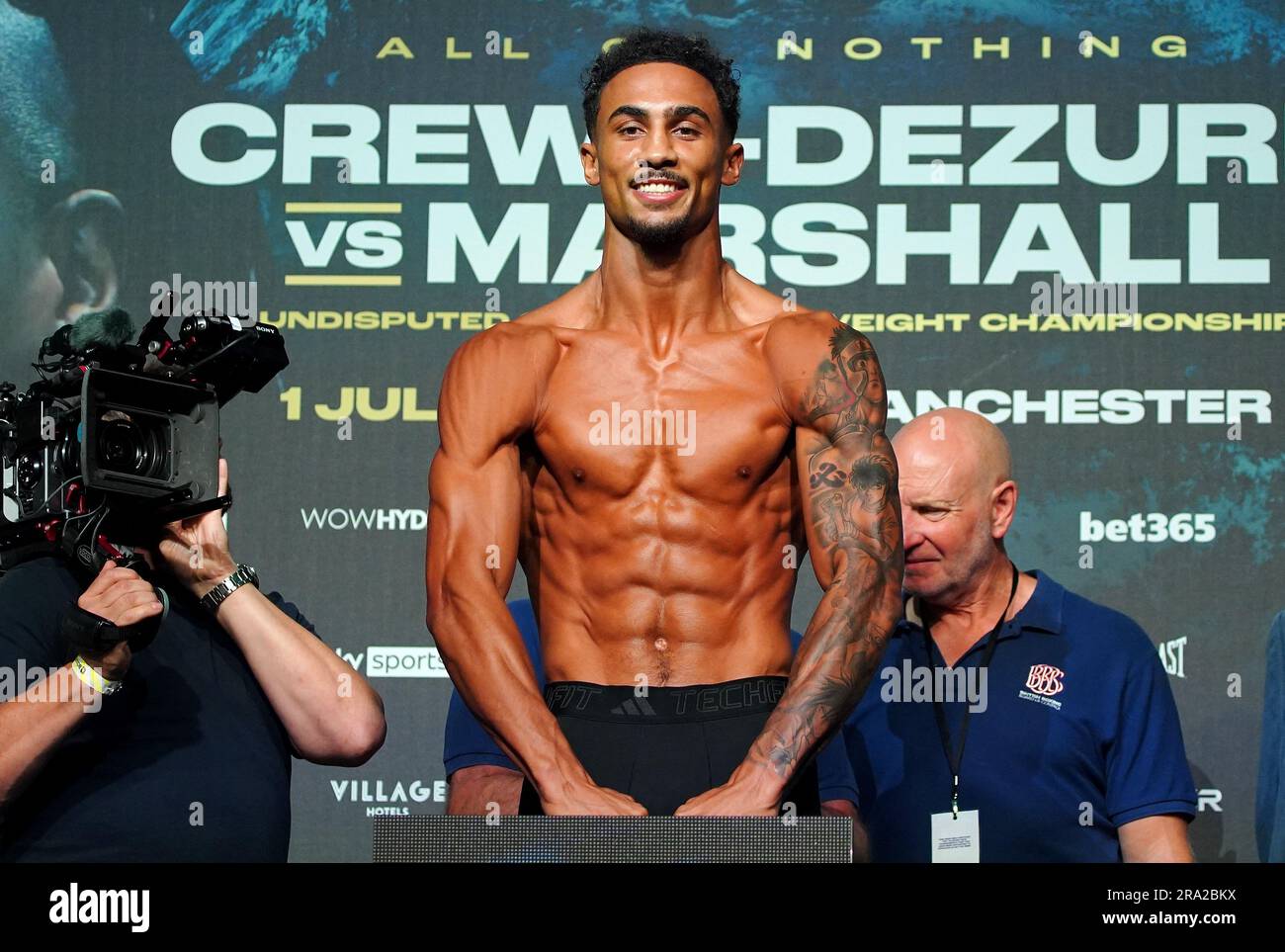Figuring out a boxer's exact weight, especially in kilograms, is often a big point of interest for fans and those who follow the sport closely. It's a rather central part of how professional boxing works, you know, with all the different weight classes and such. For someone like Ben Whittaker, a name that's certainly been making waves, his weight in kilograms isn't just a number; it's a key part of his professional identity and how he performs in the ring. So, it's almost a given that people want to know about it.
Knowing a boxer's weight, particularly their fighting weight in kilograms, tells us a lot about the category they compete in. This, in turn, really shapes who they might face and what their physical advantages or challenges could be against opponents. Ben Whittaker, like any skilled boxer, has to manage his weight very carefully, and that's actually a huge part of his training and preparation for any bout.
The whole process of a boxer making weight, or cutting weight, is a serious business. It involves a lot of discipline, from what they eat to how they train, and it’s all geared towards hitting that precise kilogram mark on the scales. This isn't just about looking good; it's about being at peak condition to deliver those powerful punches and move with the necessary quickness. So, in some respects, understanding Ben Whittaker's weight in kilograms helps us appreciate the dedication it takes to be a top-tier fighter today.
Table of Contents
- Biography and Boxing Path
- Personal Details and Bio Data
- The Importance of Weight in Boxing
- Ben Whittaker and His Weight Class
- Managing a Boxer's Weight in Kilograms
- Training and Diet for Weight Management
- How Weight Impacts Performance
- The Weigh-In Ritual
- Future Weight Considerations
- Frequently Asked Questions About Ben Whittaker
Biography and Boxing Path
Ben Whittaker is a name that has certainly been resonating within the boxing community, especially since his impressive performances on the amateur scene. He's a British boxer, actually, who gained significant recognition for his skills and charisma in the ring. His journey from an aspiring young talent to a celebrated professional has been quite something to watch, really.
His early days in boxing saw him gather a lot of experience and win some important medals. This foundation helped shape him into the fighter we see today. It's a path that many promising boxers follow, starting small and gradually building up their reputation, you know, with each fight and each victory.
Transitioning from amateur to professional boxing is a big step for any athlete, and for Ben Whittaker, it meant adapting to new rules, longer rounds, and a different kind of competition. This shift often involves changes in training and, very importantly, managing one's body, including their weight in kilograms, to fit specific professional categories. He's been doing pretty well, all things considered, since turning pro.
Personal Details and Bio Data
When we talk about a professional athlete like Ben Whittaker, there are some key pieces of information that fans and analysts often look for. These details help to paint a picture of the person behind the punches. It's about more than just their fight record; it's about understanding their physical makeup and background, which are quite important in a sport like boxing.
Here's a quick look at some general bio-data points for a boxer of his standing. This information is typically what people want to know when they are getting familiar with a fighter. It helps to give a complete profile, basically.
| Full Name | Benjamin "Ben" Whittaker |
| Nationality | British |
| Born | June 6, 1997 |
| Age (as of current date) | 26 (as of late 2023 / early 2024) |
| Stance | Orthodox |
| Boxing Category | Light-Heavyweight (typical professional weight class) |
| Professional Debut | Mid-2022 (approximate) |
The Importance of Weight in Boxing
Weight is, arguably, one of the most fundamental aspects of professional boxing. It’s not just a casual detail; it actually dictates the very structure of the sport. Boxers compete in specific weight divisions, and this system is in place to ensure fair competition. So, you won't typically see a very light boxer fighting someone significantly heavier, which just makes sense, doesn't it?
These weight classes are there to try and create a level playing field, or at least as level as possible, between competitors. Imagine if there were no weight limits; the bigger, heavier person would almost always have a huge physical advantage. That wouldn't be much of a sport, would it?
For a boxer like Ben Whittaker, hitting his target weight in kilograms is absolutely crucial before every single fight. If he doesn't make the weight for his chosen category, the fight might not happen, or he could face penalties. This pressure to make weight is a constant part of a boxer's life, and it's something they train for just as much as they train for punching and dodging, really.
Ben Whittaker and His Weight Class
Ben Whittaker, like many boxers who have made a name for themselves in the amateur ranks, has settled into a particular weight class as a professional. For him, that's typically the light-heavyweight division. This class has a specific upper limit in terms of kilograms, and every boxer competing in it must be at or below that limit on the day of the weigh-in.
The light-heavyweight division generally has a limit of around 79.38 kilograms, or 175 pounds. This means that for any of his fights in this category, Ben Whittaker needs to ensure his body weight is at or under that mark. It's a very precise requirement, and honestly, there's no room for error when it comes to the scales.
Choosing a weight class isn't just about what you weigh right now; it's also about where your body feels strongest and most effective. For Ben, the light-heavyweight division seems to be where he can use his natural attributes, like his speed and power, to their best advantage. It's a strategic choice, you know, for his career path.
Managing a Boxer's Weight in Kilograms
The process of managing a boxer's weight is incredibly detailed and, frankly, quite demanding. It's not just about losing a few pounds; it's about fine-tuning the body to be at its optimal fighting weight while still retaining strength and endurance. This is something Ben Whittaker and his team would focus on intensely, pretty much all the time.
Boxers often walk around at a weight that is naturally a bit heavier than their fighting weight. This is completely normal. The trick is to gradually and safely reduce that weight as a fight approaches. This reduction is carefully planned, often starting weeks or even months before the actual fight date.
The goal is to shed excess water and some body fat without sacrificing muscle mass or energy levels. It’s a delicate balance, and it takes a lot of experience and scientific understanding to get it just right. For a boxer, their weight in kilograms is a constant consideration, even outside of active training camps, you know.
Training and Diet for Weight Management
Achieving and maintaining a specific weight in kilograms for a boxing match relies heavily on two main pillars: rigorous training and a meticulously planned diet. These two elements work hand-in-hand to sculpt a boxer's physique and prepare them for the demands of competition. It’s a full-time commitment, really, for someone like Ben Whittaker.
Training camps are designed to push a boxer's physical limits, burning calories and building stamina. This includes intense cardio, like running and skipping, as well as strength work and, of course, sparring. All of this activity helps to shed any extra weight and get the boxer lean and strong, which is quite important.
The diet aspect is just as, if not more, critical. It's not about starving; it's about eating the right kinds of foods in the right amounts. This typically means a diet rich in lean proteins, complex carbohydrates, and healthy fats, with very precise portion control. As a matter of fact, every meal is usually calculated to support the training while moving towards the target weight in kilograms.
In the final days leading up to the weigh-in, boxers often engage in what's known as "water cutting." This involves carefully manipulating fluid intake to shed a few extra kilograms of water weight. It's a temporary measure, of course, and it requires careful monitoring by medical professionals to ensure the boxer's health. This part is, you know, pretty intense.
How Weight Impacts Performance
A boxer's weight in kilograms has a direct and significant impact on their performance in the ring. Being at the correct weight isn't just about qualifying for the fight; it's about being able to perform at your absolute best. If a boxer is too heavy, they might feel sluggish and lose some of their speed and agility, which is a real problem.
On the other hand, if a boxer cuts too much weight too quickly, or if they are naturally too light for a division, they might feel drained and lack the power needed to deliver effective punches. It’s a very delicate balance, and getting it wrong can seriously affect a boxer's energy levels and their ability to absorb blows, too.
The aim is to be strong, fast, and resilient within your chosen weight class. For Ben Whittaker, being at his optimal fighting weight in kilograms means he can move fluidly, throw punches with maximum impact, and maintain his stamina throughout the rounds. It's all about maximizing his physical attributes for the specific demands of a boxing match, pretty much.
The Weigh-In Ritual
The weigh-in is a very important event that happens typically the day before a boxing match. It's the official moment when both fighters step onto the scales to confirm they have made their agreed-upon weight limit for their respective category. This event is actually a big part of the pre-fight build-up, with cameras and fans watching every moment.
For a boxer like Ben Whittaker, stepping on those scales is the culmination of weeks, sometimes months, of strict discipline and hard work. The number that flashes up on the display, measured in kilograms, determines if the fight can proceed as planned. It's a moment of truth, so to speak, for both fighters.
After successfully making weight, boxers immediately begin the process of rehydration and refueling. This is about putting back the fluids and nutrients lost during the weight-cutting process so they can be at their strongest for the fight itself. It's a crucial recovery period, honestly, before they step into the ring.
Future Weight Considerations
As a boxer's career progresses, their body naturally changes, and so too might their ideal fighting weight. What works for a boxer in their early twenties might not be the best fit as they get older. This is a common part of an athlete'



Detail Author:
- Name : Erika Medhurst
- Username : wjones
- Email : lon.wolff@gmail.com
- Birthdate : 1986-08-07
- Address : 10168 Rogahn Mill West Douglas, RI 12208
- Phone : 320.956.5027
- Company : Stiedemann, Nitzsche and Hoppe
- Job : Fiberglass Laminator and Fabricator
- Bio : Similique assumenda molestiae ullam omnis. Cum nihil et omnis consequatur sed. Rerum nulla dolor qui nostrum suscipit repellendus. Nam nobis fugiat ut non nemo.
Socials
tiktok:
- url : https://tiktok.com/@aoberbrunner
- username : aoberbrunner
- bio : Natus et illum veniam quisquam qui veniam ducimus.
- followers : 1819
- following : 1823
instagram:
- url : https://instagram.com/araceli4579
- username : araceli4579
- bio : Id qui ea expedita. Illo praesentium occaecati consectetur quis maxime in.
- followers : 344
- following : 2012
linkedin:
- url : https://linkedin.com/in/araceli_official
- username : araceli_official
- bio : Eligendi necessitatibus dolorem corporis.
- followers : 464
- following : 2272